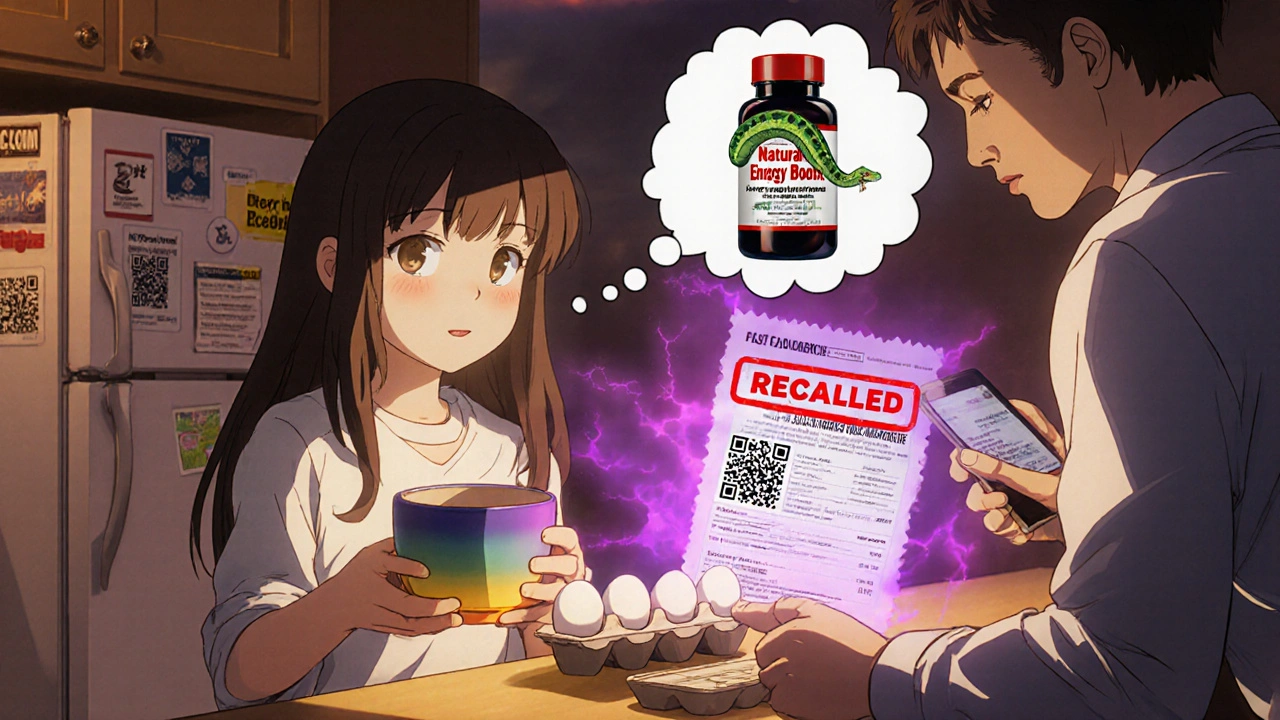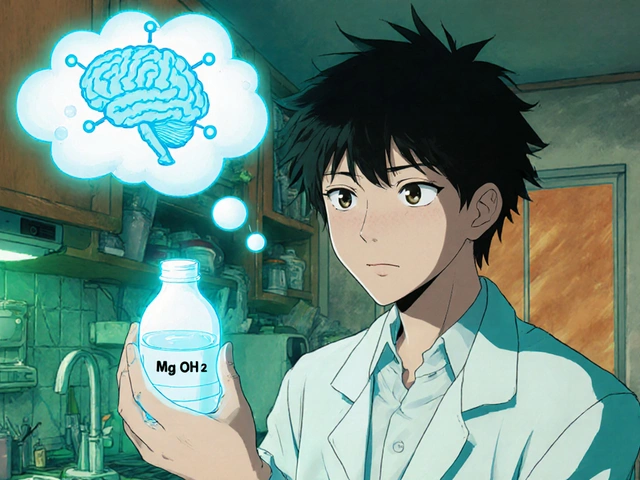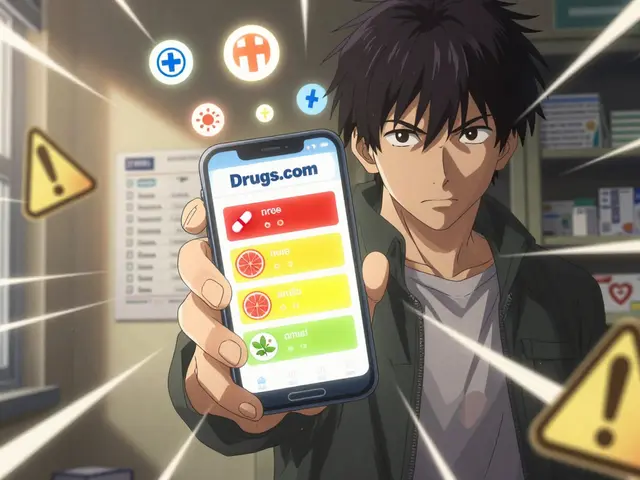
FDA Safety Alert Checker
Check Your Product Safety
Enter product information above to check FDA safety alerts
The FDA doesn’t wait for disasters to happen. When something dangerous slips through the cracks - whether it’s a faulty pacemaker, a supplement laced with erectile dysfunction drugs, or eggs contaminated with salmonella - they act fast. In 2025, the agency made some of its biggest changes yet to how it warns the public. If you’re taking medication, using a medical device, or even buying eggs off the shelf, you need to know what’s changed and what’s being pulled.
Medical Devices Now Get Faster Warnings
Starting September 29, 2025, the FDA began issuing Early Alert Communications for every high-risk medical device. This isn’t just a tweak - it’s a full overhaul. Before, warnings about dangerous implants, ventilators, or insulin pumps often came after injuries piled up. Now, the moment the FDA identifies a potential safety issue, they alert hospitals, distributors, and doctors - sometimes before a formal recall is even filed.
Why does this matter? Because time kills. A faulty heart monitor might not fail immediately, but if it gives false readings during surgery, lives are at risk. The new system cuts the delay from weeks to days. The FDA says this change is meant to help healthcare facilities respond within 24 hours. But here’s the catch: not every hospital does. A 2025 study found only 58% of U.S. hospitals have a dedicated team checking FDA alerts daily. If you or a loved one uses a device like a cochlear implant, a spinal stimulator, or a glucose sensor, check the FDA’s Recalls, Market Withdrawals, & Safety Alerts page monthly. Don’t assume your doctor will tell you.
Drug Warnings Are Getting More Specific
In June 2025, the FDA updated the labeling for mRNA COVID-19 vaccines to include a clearer warning about myocarditis and pericarditis - inflammation of the heart muscle or lining. It wasn’t new information, but now it’s part of the official prescribing guide. That means doctors can’t claim they didn’t know.
But the real story is in the compounded drugs. In September 2025, the FDA sent over 50 warning letters to companies making unapproved versions of semaglutide (the active ingredient in Ozempic and Wegovy). These weren’t small pharmacies. Some were large labs selling bulk injectables online. The problem? No quality control. One batch had 200% more drug than labeled. Another had traces of heavy metals. The FDA says these compounds are causing kidney failure, strokes, and severe allergic reactions. If you’re getting a "GLP-1 weight loss shot" from a clinic that doesn’t name the manufacturer or lists "compounded" on the bottle, walk out. The FDA is cracking down - and they’re not just sending letters. They’re shutting operations down.
Dietary Supplements Are a Wild West - And the FDA Is Fighting Back
Every month in 2025, the FDA has pulled another supplement off the market for hiding pharmaceuticals. In March, One Source Nutrition recalled Vitality Capsules because they contained sildenafil (Viagra) and tadalafil (Cialis). In February, Natural Dior LLC pulled Vitafer-L Gold Liquid for the same reason. These aren’t rare. The FDA found 12 major supplement recalls in 2025 alone, all with hidden drugs. Most target men over 40 looking for energy, libido, or muscle gain. The companies don’t list the drugs because they’re illegal to sell without a prescription. But they’re there - and they can cause dangerous drops in blood pressure, especially if you’re also taking nitrates for heart disease.
Here’s what to do: if a supplement promises "instant results," "clinically proven," or "natural Viagra,” it’s likely tainted. Look up the product on the FDA’s Dietary Supplement Product Registration Database. If it’s not listed, skip it. And don’t trust labels that say "Made in the USA" - many of these products are made in China, shipped here, and repackaged.

Food Alerts Are More Frequent - And More Dangerous
Food safety alerts jumped 22% in 2024, and 2025 is worse. In August, the FDA warned against imported cookware that leaches lead into food. In September, they pulled black sheep eggs after tests found salmonella. And in July 2024, a public health alert for lead-tainted ground cinnamon sparked thousands of Reddit posts from people testing their spice jars with home kits.
Lead doesn’t just cause stomach upset. In kids, it can permanently lower IQ. In adults, it damages kidneys and raises blood pressure. The problem? These products often come from unregulated suppliers. A $5 pot from an online marketplace might look fine - until you realize it’s made with lead-based glaze. The FDA doesn’t test every imported item. They rely on reports from consumers and state health departments. If you bought a new cooking pot, saucepan, or ceramic bowl from a discount store or Etsy seller and it’s brightly colored or handmade, wash it thoroughly and consider getting it tested. Lead testing kits cost under $20 at hardware stores.
What’s Changing in 2025 - And What’s Not
The FDA did something unusual in June: they removed a safety requirement. They eliminated the Risk Evaluation and Mitigation Strategies (REMS) for CAR T-cell therapies - cancer treatments that reprogram a patient’s own immune cells. Why? Because after five years of real-world use, they found the serious side effects - like cytokine storms - were being managed better by hospitals. The REMS had forced patients to be monitored in special centers. Now, many can get treated in regular oncology clinics. It’s rare for the FDA to reduce restrictions. It means the system can adapt when data proves safety.
But not all changes are progress. The FDA still struggles with alert fatigue. Clinicians get so many emails, texts, and system pop-ups that many start ignoring them. A JAMA Internal Medicine study in 2025 found 35% of doctors skip routine alerts. That’s why the agency is testing AI filters that only send alerts relevant to your specialty. A cardiologist won’t get a warning about a faulty toothbrush. A pediatrician won’t get one about a prostate device.

How to Protect Yourself Right Now
You can’t monitor every product. But you can protect yourself with three simple steps:
- Sign up for FDA email alerts. Go to FDA.gov/alerts and subscribe to the categories you care about: drugs, devices, food, supplements. No spam. Just official notices.
- Check your prescriptions. If you’re on a new medication, especially a generic or compounded version, look up the manufacturer. If it’s a company you’ve never heard of, call your pharmacist. Ask: "Is this FDA-approved?" If they hesitate, get a second opinion.
- Don’t trust "natural" claims. Supplements labeled "herbal," "traditional," or "ancient remedy" are the most likely to contain hidden drugs. If it’s too good to be true, it’s probably dangerous.
And if you think you’ve been harmed by a product? Report it. Use MedWatch, the FDA’s online reporting tool. Your report could help stop a dangerous batch before it hurts someone else.
What’s Next?
The FDA is testing blockchain systems to track high-risk products from factory to shelf. Imagine being able to scan a QR code on your eggs and see exactly where they came from, when they were tested, and if any batches were flagged. Pilot programs started in early 2025. If they work, this could become standard by 2027.
For now, the system isn’t perfect. But it’s faster, smarter, and more transparent than ever. The key isn’t waiting for the FDA to save you. It’s knowing how to use their tools - and staying alert yourself.
How often does the FDA issue safety alerts?
The FDA issues dozens of safety alerts every month. In 2024, they released 178 food safety alerts, 89 drug warnings, and 62 medical device notices. In 2025, that number is rising, especially for dietary supplements and compounded drugs. The agency now publishes updates daily on its website, so checking weekly is a good habit.
Are FDA recalls mandatory?
For food, drugs, and medical devices, recalls are usually voluntary - meaning the company agrees to pull the product. But if a company refuses, the FDA can legally force a recall. That’s rare, but it’s happened with tainted infant formula and unsafe implants. The FDA has the power to shut down manufacturing facilities if a company ignores safety warnings.
Can I trust supplements labeled "FDA-approved"?
No. The FDA does not approve dietary supplements before they’re sold. Only drugs and medical devices go through that process. If a supplement says "FDA-approved," it’s misleading. The FDA only steps in after problems arise - like finding hidden drugs or contaminants. Always look for third-party testing seals (USP, NSF, or ConsumerLab) instead.
What should I do if I find a recalled product at home?
Stop using it immediately. Don’t throw it in the trash - some recalls require you to return it for safe disposal. Check the FDA alert for instructions. For medications, take them to a pharmacy with a drug take-back program. For devices, contact the manufacturer. For food, discard it safely and clean surfaces with hot, soapy water. If you’ve used it and feel unwell, call your doctor and report it to MedWatch.
Why do some alerts take so long to appear?
Some delays happen because the FDA needs time to confirm a pattern. One report of a side effect could be a coincidence. But when multiple people report the same issue - especially with serious outcomes - the agency investigates. For medical devices, the new Early Alert system cuts that delay to days. For food or supplements, it can still take weeks if the source is overseas or the contamination is hard to trace.
Write a comment
Your email address will not be published.





17 Comments
I just check the FDA site once a year. If something's bad enough to kill me, I'll hear about it on the news.
Yessss! 🙌 I signed up for the alerts last month and already caught a sketchy supplement I was about to buy. You guys are so right - don't trust 'natural Viagra' labels. I'm telling my dad this. He's been buying those gummies for 'energy'. 💪❤️
The FDA's 'Early Alert' system is a gimmick. They've been doing this since 2012 under different names. The real issue is hospitals ignoring them. 58% is a joke. You'd think doctors would care more than their golf scores
This is actually really important stuff. I work in a rural clinic and we get maybe 2-3 alerts a week. Most of the time, we're scrambling to update records because the system doesn't integrate with our EHR. The FDA needs to build API access for small practices. Not everyone has a compliance officer.
In Nigeria we just buy what's cheap and hope. But I read this and I'm like wow. You guys have systems. We have no alerts. No database. Just word of mouth. If your neighbor's son got sick from a pill, you stop buying it. That's our FDA.
THEY'RE HIDING THE TRUTH. I know a guy who got a 'compounded semaglutide' shot and his kidneys started bleeding. The clinic said it was 'natural plant extracts'. They're all in on it. Big Pharma owns the FDA. You think they want you healthy? Nah. They want you on meds forever. I'm not taking anything anymore. I drink lemon water and pray.
Lead in pots? How is this even still a thing? Did we forget the 1970s? If you're using a 'handmade' ceramic bowl from Etsy, you're basically eating lead cookies. It's criminal. And people pay $80 for it because it's 'artisan'.
It's funny how we trust institutions until they fail us... then we swing to total distrust. But maybe the real question is: why do we expect perfection from systems designed by humans? The FDA isn't a god. It's a bureaucracy trying to catch up. We're the ones who have to stay awake.
I just checked my cinnamon jar. It's from a local spice shop. I googled the batch and it's fine. But I bought a new cast iron pan last week - gonna test it tomorrow with one of those $15 kits from Home Depot. Better safe than sorry.
Let's be real - the FDA is a toothless tiger. They issue alerts but don't have the manpower to enforce them. Meanwhile, Chinese factories pump out lead-glazed pots, counterfeit Ozempic, and 'energy' supplements laced with Viagra like they're selling candy. The only reason this got attention is because it hit white middle-class Americans. If this was happening in a poor neighborhood? They'd just call it 'the cost of living'.
I got a pacemaker last year. I check the FDA alerts every Monday. My cardiologist hasn't even heard of the Early Alert system. I had to print out the notice and hand it to him. He said 'huh, interesting' and put it in a drawer. I'm not dying because some doctor doesn't read his email.
This is all part of the Great Depopulation Agenda. The FDA, WHO, CDC - they're all connected. They want you dependent on meds so you'll never question the system. They let lead in pots because it weakens your brain. They approve tainted supplements because they want you to have heart attacks. The real danger isn't the product - it's the silence. You're being conditioned to ignore the warnings. Wake up.
Honestly, this post is a lifesaver. I used to buy supplements from Amazon because they were cheap. Now I only buy ones with USP or NSF seals. I told my mom, my sister, my neighbor - everyone. Small actions add up. You don't need to be an expert. Just be curious.
I'm a nurse. We get 15+ alerts a day. Most are useless. But when one matters? It matters big time. The AI filters they're testing? Long overdue. I don't need to know about a faulty toothbrush. I need to know if the insulin pump my patient is using just got flagged. Make it smart. Please.
The FDA's methodology is statistically flawed. Their alert triggers are based on anecdotal reports, not longitudinal cohort studies. The correlation between 'natural supplements' and hidden drugs is high, but causality is never established. Furthermore, the reliance on consumer self-reporting introduces significant selection bias. This is not evidence-based policy - it's reactive panic management.
I just started checking the FDA site after my aunt had a bad reaction to a supplement. I didn't know they had a database. I feel silly now. But I'm glad I found it. Thank you for sharing this. I'm sharing it with my book club.
I live in Canada. We don't get FDA alerts automatically. But I check the site anyway. I think we're all just trying to survive in a world where everything's trying to kill us. The fact that someone took the time to write this? Means something. Thanks.